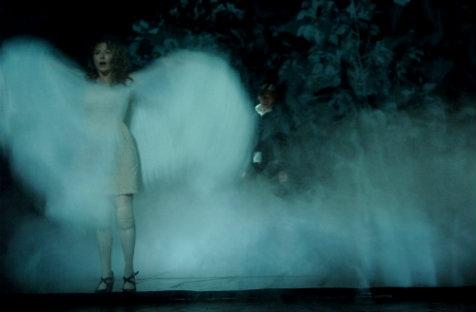The European legend of the vampire – the soulless creature feeding on the blood of mortals to prolong its undead existence – was made infamous by Bram Stoker in his Gothic novel, Dracula. Grzegorz Jarzyna has used this literary masterpiece as the core material for his stage work, Nosferatu.
Set in a drawing room reminiscent of a modern soap opera – huge bay windows, drinks trolley and atrium – we meet the 21st Century variations of the novel’s characters. These are not the prudish Victorians of Stoker’s era; from the opening moments of the play, where Jonathan Harker attempts to have a mobile phone conversation – a moment which had the audience seeking out the ringtone’s culprit – it is clear that these are a collection of self-centred and self-absorbed individuals.
Lucy alludes to her sexual desires; Arthur circles the room, seeking the perfect angle to photograph everyone; Seward espouses on particle theory; Mina looks on, disinterested and ignored. Only Renfield is vaguely recognisable as his literary counterpart, constantly returning to the atrium – the faux asylum.
Through the soundscape and lighting effects we are able to intimate that the vampire has captured Lucy and is slowly killing her. This is brought to the fore in the arrival of the new neighbour for dinner, and Lucy’s subsequent seduction of the guest and submission to his desire for her blood. Her transformation is highlighted by a stunning silkscreen visual effect that is impactful, but underutilised.
With the arrival of Van Helsing, the cast is complete, but unlike the novel, there is no hunt to stop the vampire; rather, each individual seeks to find their own moment and motivation. Jonathan is driven by business; Arthur to capture the perfect image – even Lucy’s desecrated grave cannot stop him. Mina hungers to be recognized; Van Helsing and Seward play a continual game of medical one-upmanship. Only Lucy and Renfield, as servants to the Master, are driven to satisfy anyone other than themselves.
This, ultimately, is Jarzyna’s point. We no longer fear the vampire because we live in a society filled with them. There are no longer limits or boundaries; everyone is out for their 15-minutes of fame, financial reward and recognition, preferably without too much effort. So, rather than hunting and destroying the evil, it commits a form of social suicide; there is no longer any sustenance to be gained.
There were two major issues that detracted from this production: the language barrier and the staging. Nosferatu is presented in Polish, with surtitles, but, at times, they were out of sync with the verbal delivery (obvious even to those of us who don’t speak Polish). At one point the surtitles were obstructed by a set piece. Also, the venue seemed too large for the work; the actors appeared uncomfortable on the stage and unable to fill it, which took away some of the mood and tension that could have been generated.
Nosferatu is, however, a perfect platform for the exploration of and commentary on the vampirism of 21st Century societal norms. It uses known material – both classic and modern – to draw its parallels, and it is here that the play truly succeeds.
Rating: 4 stars out of 5
Nosferatu
Adaptation and direction by Grzegorz Jarzyna
Produced by TR Warszawa and Teatr Narodowy
Music: John Zorn
Performers: Jan Englert, Krzystof Franieczek, Jan Frycz, Marcin Hycnar, Sandra Korzeniak, Cezary Kosínski, Lech Lotocki, Katarzyna Warnke, Adam Woronowicz with Jacek Telenga
The Dunstan Playhouse – Adelaide Festival Centre
14 – 17 March
Adelaide Festival 2013
www.adelaidefestival.com.au
1 – 17 March





